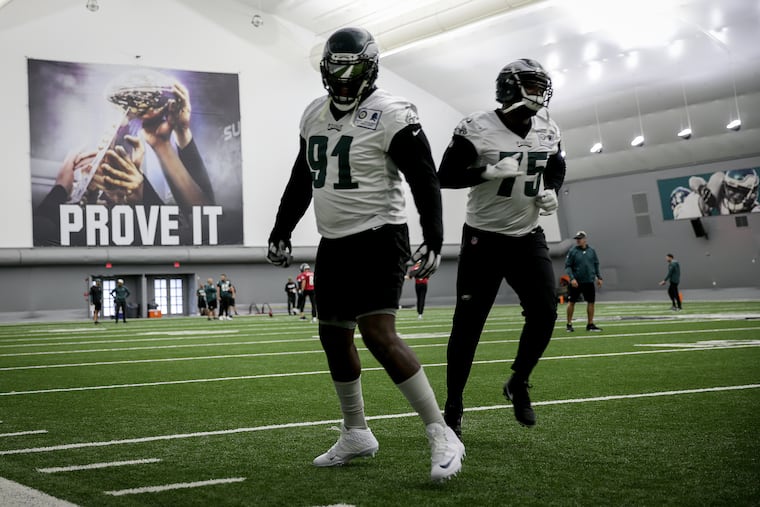City says no Eagles fans in stands for home opener; Vinny Curry struggles with loss of brother
The veteran defensive end lost his half-brother to COVID-19 back in May. He returns to the Eagles coming off a good year as a pass rusher.

On the day that Philadelphia Health Commissioner Thomas Farley reiterated that city COVID-19 restrictions likely will not allow the Eagles to host any fans at Lincoln Financial Field for the scheduled Sept. 20 home opener, defensive end Vinny Curry said the death of his half-brother from the virus made him think hard before signing to play another NFL season.
Those developments were a reminder of the difficulty of what the Eagles and the NFL are trying to do in the midst of a pandemic that is without precedent in modern times. They also served as a counterpoint to more-optimistic developments — the team’s announcement earlier in the day that offensive lineman Jordan Mailata has returned from the COVID-19 restricted list, leaving no Eagles with that status, and coach Doug Pederson’s quick return to the team on Wednesday, after a 10-day absence following positive tests.
Farley said on July 14 that guidelines in place at that time wouldn’t allow fans to be present at the Linc. The team has been hoping the virus situation would improve to where the city might at least allow some fans, but “it’s going to be unlikely that situation will change by Sept. 20,” Farley said Thursday. The Eagles are scheduled to host the Los Angeles Rams in their home opener.
Assuming he remains healthy, Curry, 32, will be allowed at the Linc on that date, strengthening what looks like a deep Eagles defensive line. But the decision to return last week for a year and $2 million was less than automatic, Curry said, even though he had been sitting on the free-agent market since March.
Asked whether the possibility of getting the virus concerned him, after dealing with the May 3 death of his half-brother, high school principal Gerald Glisson, Curry said: “Absolutely. That’s why I signed so late.”
Glisson, 46, was an idol to Curry as he was growing up — a football player at Delaware State who was “all-world at football and basketball,” as far as his younger half-brother was concerned.
“It went from a regular upper-respiratory infection to, the next thing you know – my brother’s a big dude, man, 6-foot-5, 300 — he couldn’t walk to the bathroom. The rest is crazy,” said Curry, who wasn’t allowed to visit Glisson in the hospital. He described being in a state of shock, “a deer in the headlights,” as Glisson passed away.
Glisson was a married father of two who served as principal of operations at Eastside High in Paterson, N.J. New Jersey Gov. Phil Murphy called him “a giant” who was “a beloved, respected presence, not to mention a role model.”
Curry said he and Glisson spoke “every single day” before the illness struck.
“The passing of my brother has been hard on me. I just thought I should take my time with it,” Curry said. “I didn’t even think about the game, honestly. But I started to get the itch [to play]” eventually.
Curry said that when the Eagles’ facilities opened, he began hearing from teammates that things seemed safe, and he has been further reassured since returning to the NovaCare Complex. He called the precautions “phenomenal,” and said he was “very comfortable” there.
Curry was a second-round Eagles draft pick in 2012 who grew up in Neptune, N.J., rooting for the team. After Super Bowl LII, he left in free agency for the Tampa Bay Bucs, but was released after one season, and last year played a solid reserve role for the Eagles, with 41 pressures, according to Pro Football Focus, and five sacks, while playing just 38 percent of the defensive snaps. PFF gave Curry a pass-rush grade of 79.9 and ranked him 17th in the NFL in pass-rush productivity.
Curry acknowledged his Tampa Bay experience affected his reluctance to sign elsewhere again.
“You imagine going somewhere … you know in your heart you shouldn’t have left in the first place,” Curry said.
Inquirer reporter Laura McCrystal contributed to this report.